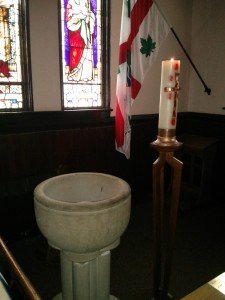 The sacrament of baptism is more than a one-day celebration; it is a life-long commitment. Each Sunday of Lent I will offer a reflection on one of our baptismal vows.
The sacrament of baptism is more than a one-day celebration; it is a life-long commitment. Each Sunday of Lent I will offer a reflection on one of our baptismal vows.
Will you strive to safeguard the integrity of God’s creation, and respect, sustain and renew the life of the Earth?
While the inclusion of this vow is new to the baptismal covenant, the commitment to preserving God’s creation is not. Care for creation is a moral and religious issue, and requires of us the use our God-given gift of knowledge. (See the recent interview of Katharine Jefferts Schori)
Integrity
“The nobility of our lives depends upon the manner in which we come to understand and fulfill our assigned role.” (Thomas Berry, The Great Work). In Genesis humans are granted dominion over the planet, yet an attitude of domination has led to a lack of integration with the natural world. God’s post-flood covenant is with not just humankind but with the whole earth for all future generations (Gen 9.12-13); we as humans need to re-educate ourselves in ways to establish our relationship with all of creation; through re-reading the scriptures, new practices, renewed prayers, renewed humility. We must live in the reality that “[t]he whole earth is a living icon of the face of God.” (St. John Damascene)
God’s Creation
The world around us, we are challenged to remember, is not ours; we did not make it, we can not own it. It takes humility to remember, despite all our efforts of control, that this is God’s world, called and loved into being (Gen 1.2), and we are merely guests. While we have been gifted with self-awareness and self-reflective consciences, we are also tasked with the responsibility of care. Human ignorance and greed is destroying God’s creation, thereby offending and insulting that same creation. This vow encourages us to consider our relationship to the Creator as we contemplate our relationship with the Creation.
Life
It is impossible to have healthy people living on an unhealthy planet. Our lives are enriched by the natural world around us, and we might enhance this by engaging in relationship with God’s wonders of all sizes. Whether amazed by the heights of Kilimanjaro, or entranced by the passage of a snail on the sidewalk, we are called to see, appreciate, and care for all of the world as a gift from God. Even those things we may not like are beautiful in God’s eyes and serve a wondrous purpose (for example, dandelions are used for salad, wine, coffee substitute, and has medicinal values, as well as their colourful brightness). We are encouraged to remember that God doesn’t make garbage; God makes life.
Holy One,
Have mercy upon us, your children.
Forgive us our hurtful actions which harm your creation.
Forgive us our selfish attitudes which neglect to recognize the earth as our neighbor.
Forgive us our ignorance to not see the connections between our deeds and the scars on your creation.
Holy One,
Have mercy on us, your children.
Help us to act in ways that demonstrate love for our sustaining earth.
Help us to think beyond ourselves to consider all your creatures as family.
Help us to see the effects of our actions.
Holy One,
Have mercy on us, your children.
Guide us to live into the hope and promise of redemption that only you can offer us.
Amen.
CC BY-NC-ND
